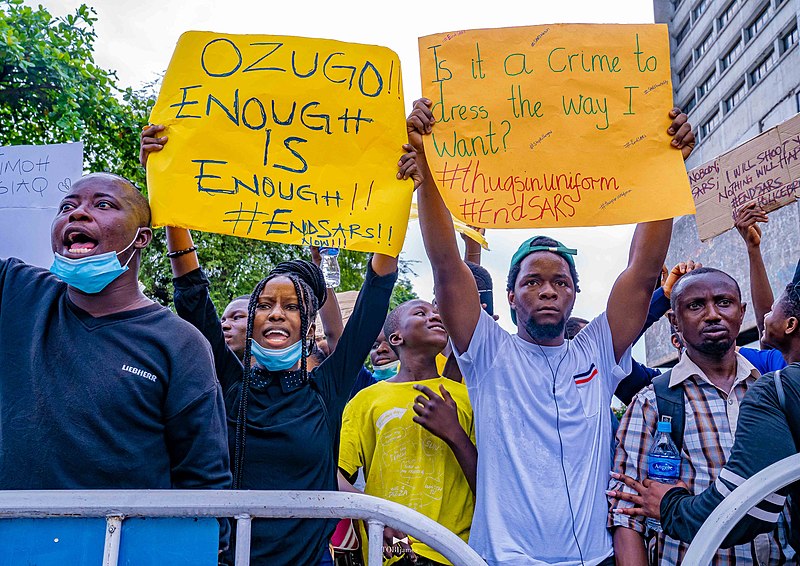
How to support the #EndSARS protests outside of Nigeria
We've pulled together some ways that people in diaspora and beyond can help those facing despicable violence on the ground from the authorities.
gal-dem staff
21 Oct 2020
Photography via Wikimedia Commons / TobiJamesCandids
We are heartbroken today. After a summer where we were repeatedly shown that not enough people believe Black Lives Matter, the news coming out of Nigeria of a massacre of peaceful #EndSARS protestors at Lekki toll gate was a punch to the gut.
A lot of people in the diaspora and beyond were left wondering how they could support their Nigerian bredren at this tragic time. Key to our actions right now must be listening to those on the ground and amplifying their voices, as well as using our capital to donate to grassroots activists where possible and taking the time to educate ourselves on the situation. Below are some ways you can do just that:
Journalists and organisations
If you’re looking to keep up to date with what’s happening on the ground, follow Nigerian journalists who are writing and reporting on the ongoing police brutality in Nigeria on social media. The Nigerian National Broadcasting Commission (NBC) has asked Nigerian news outlets to not “embarrass” individuals or the government, meaning many media organisations across Nigeria and beyond aren’t reporting on the protests.
Some people in Nigeria are claiming their posts are being flagged as “fake news” on Facebook and Instagram, so look on Twitter and other social media sites too.
There are loads of people to follow but you could start with Yagazie Emezi, a Nigerian artist and photojournalist who has been documenting #EndSARS with arresting imagery and comprehensive captions. BBC Africa journalist Yemisi Adegoke also regularly reports on the #EndSARS movement on Twitter, posting accessible succinct updates, while Feyikemi Abudu, the co-host of I Said What I Said Podcast, has been a particularly vocal organiser who has helped to provide medical assistance for injured people. In terms of media organisations and collectives, ARISE News is one of the few media outlets in Nigeria who are said to be reporting accurately, including at the Lekki toll gate massacre, while Feminist Coalition, a group of young Nigerian feminists formed in July 2020, are fighting #EndSARS injustices through peaceful protests, fundraising and social media organisation.
Fundraisers
Donating funds directly to those protesting on the ground is one of the most effective ways we can give support to the #EndSARS movement right now. With reports of gunfire ongoing across Lagos, people in Nigeria are distributing funds directly for the treatment of gunshot victims, medical supplies and for food and drink.
The most widely shared fundraiser has been from the Feminist Coalition but as of the 23 October, they have closed their fund, stating that the rest of the money they have raised will go to funding medical emergencies, legal aid, and relief for victims of police brutality and families of the deceased. When it was open, the fund took donations via Bitcoin and you could sign up via Coinbase to get your donation through.
Both the Assata Collective and the Emergency Aid Fund For Queers are specifically donating to queer and trans Nigerians and their allies, including Safe House (who you can donate to directly by emailing safehquseng@gmail.com), which is providing temporary safe houses for queer #EndSARS protesters and coordinators. The Emergency Aid GoFundMe details how the Nigerian police have been targeting, harassing, robbing and killing Nigerian youth who appear to be queer.
Another GoFundMe, Diasporans Against SARS, set up specifically for those living outside of Nigeria, is aiming to distribute its funds to the Kokun Foundation, a non-profit that focuses on food poverty, Feminist Coalition and others – outlining how it will publish and circulate a transparency report with those who donate to the fund.
Beyond these funds, there has been encouragement from protestors to donate specifically to individuals and activists who are on the ground. Look out for payment links in people’s bios on Twitter and Instagram – but do your research around their work first!
Petitions and writing to your MP
There are multiple petitions circulating on social media websites. Many Nigerians have urged people not to sign the UK government one asking for sanctions to be made against Nigeria as it may only escalate the situation and harm the most vulnerable citizens in the country. There have also been calls against Western intervention as historically, they have increased tensions even further and not resulted in peace.
People are encouraged to sign a petition for President Buhari to be charged before the ICC for crimes against humanity, for the United Nations to remove Hussain Coomassie from his role as UN ambassador for peace and social justice after he incited violence against the protestors and for foreign embassies to ban visas for Nigeria’s government officials and police heads.
Those who want to help internationally have also been encouraged by Black Ballad and others to write to their MPs to “demand that the UK government stops any and all funding to the Nigerian Security Services and speaks out against the possible war crimes that we are witnessing and holds the Nigerian government and army to account”. A template can be found here.
Protests and Covid-safe alternatives
While protesting continues to be dangerous within Nigeria, around the diaspora there are solidarity marches being organised. Afrobeats superstar Burna Boy has boosted the “Enough is Enough” poster which invited London’s demonstrators to gather at the Nigeria High Commission, while protests were also held in Nottingham and Dublin on 21 October.
Additional protests are also planned across the country, including in Bristol, London and Sheffield on the 23, 24 and 25 October. We’d recommend that protestors wear masks and maintain social distance.
If you can’t take to the streets, there is a social media global day of protest planned for the 22 October which you can view here. There are a number of other ways you can protest if you can’t gather in large numbers, including educating yourself on the issues at hand.
Learning context to #EndSARS
In order to understand the current situation, it’s useful to have a grasp of Nigerian history. The government, military and police system are a direct result of the power vacuum left in the aftermath of British colonisation in the 20th century – a similar system of oppression and corruption from the ruling classes arguably just changed hands.
On the 23 October, an event called Security Transformation, Youth and Leadership in Nigeria: Conversations about the #EndSARS protests, is being held by Kings university in London. On Twitter, pages from Edwin Madunagu’s The Nigerian Left are being shared as an insight into the history of anti-imperialism in the country.
Britain’s involvement in Nigeria did not just vanish once their rule was over – Nigeria has huge natural oil resources, which the global north continues to exploit (Nigeria exports the majority of its oil but largely imports its petrol). It is arguably in the interest of the UK and US governments to stay on the good side of the Nigerian government – even now, there are questions over how much money the UK government has potentially given to the SARS unit.
Annie Olaloku-Teriba has written a Twitter thread about the history of SARS, as well as writing an article for Al-Jazeera contextualising the situation as regards the ruling elite in Nigeria. You can also read gal-dem’s explainer here.
Among the BBC’s radio archive, they have a Nigerian History Collection, as well as the World Service’s Witness History podcast series, which features many episodes about Nigeria – including this 2015 episode on Buhari’s 1984 war on indiscipline.
gal-dem will be keeping this page updated throughout the week of 19 October – please tweet us @galdemzine with any suggested additions!

Britain’s policing was built on racism. Abolition is unavoidable

How Pakistan’s Khwaja Sira and transgender communities are fearing and fighting for their futures

Their anti-rape performance went viral globally. Now what?





